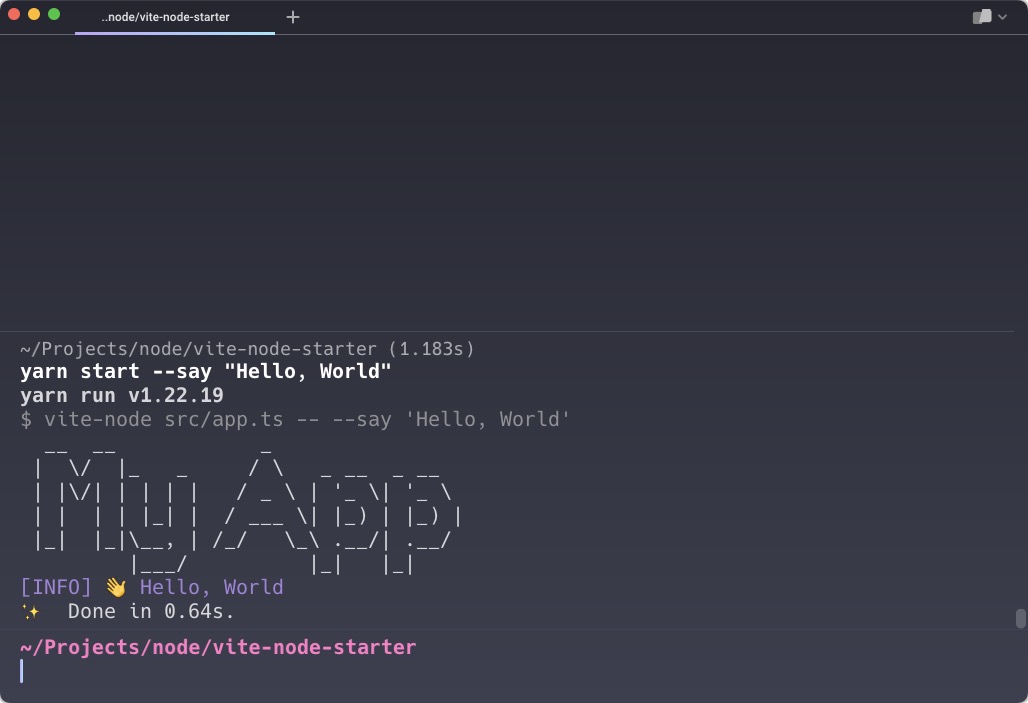Starter template for prototyping and building CLI tools with Node.js and TypeScript
- Why another starter template?
- Code
- Getting started
- Adding new scripts
- Dependencies
- Alternatives -
Deno
Why another starter template?
I created this template to help myself to build some simple tools and prototypes while learning Node.js, JavaScript
and TypeScript. There are many guides on the web that show how to build a CLI tool with Node.js and TypeScript.
However, I found them to be too complex for my needs.
That this template does not provide a way to bundle the app for distribution. It is meant to be used for learning and prototyping or for building tools that are not meant to be distributed.
Note: If you are looking for even better and more developer's friendly way to develop simple tools and prototype check out Alternatives - Deno section of this article.
Code
The code is available on GitHub: https://github.com/kolorobot/vite-node-starter
Getting started
- Clone the repository:
git clone https://github.com/kolorobot/vite-node-starter - Install dependencies:
yarn - Run sample app:
yarn start --say "Hello, World!", ornpx vite-node src/app.ts --say "Hello, World!"
- Results:

Adding new scripts
- Add script(s) to
srcdirectory. It can beTypeScriptorJavaScriptfiles. - Add any tests to
testsdirectory. - Run the script using
npx vite-node src/my-script.ts.
That's it!
Dependencies
The project was created using Vite (yarn create vite ) and later modified to use Vite-Node and Vitest (and other dependencies).
Foundation
- Vite - a new generation build tool that significantly improves the development experience.
- Vite-Node - to run files on
Node.jsusing Vite's resolvers and transformers. The engine also powersVitest. - Vitest - a test runner. Much like
Jest, but with a focus on simplicity and speed. - TypeScript - a typed superset of JavaScript that compiles to plain
JavaScript. - ESLint - a pluggable and configurable linter.
- Prettier - an opinionated code formatter.
Support and utilities
- dotenv - load environment variables from a
.envfile intoprocess.env. - chalk - a library that provides a set of tools for styling strings in the terminal.
- commander - a library for building interactive command line tools.
- inquirer - a collection of common interactive command line user interfaces.
- figlet - a library that renders ASCII art from text.
How to update dependencies?
- Check which dependencies are outdated -
yarn outdated - Update dependencies interactively -
yarn upgrade-interactive --latest
Alternatives - Deno
Deno is a free, open-source JavaScript and TypeScript runtime environment built on top of V8 JavaScript engine.
It was created as an alternative to Node.js and aims to provide a more secure and efficient runtime experience for developers.
Unlike Node.js, Deno does not require a package manager for installing third-party modules and includes built-in
support for modern web development tools such as WebSockets, HTTP/HTTPS servers, and testing frameworks.
Additionally, Deno aims to address some of the security concerns present in Node.js by offering a more secure sandboxed environment for executing scripts.
Deno can run JavaScript or TypeScript out of the box with no additional tools or config required. Here are the steps to get you started:
- Install
Denoruntime. I recommend using asdf to install it:asdf plugin add deno && asdf install deno 1.30.0 - Create a new directory for your project:
mkdir my-app && cd my-app - Create a new file:
touch app.ts - Add the following code to the file:
const name = Deno.args[0] || "World";
console.log(`Hello, ${name}!`);
- Run the app:
deno run app.ts "John Doe" - Bundle for
Denoruntime:deno bundle app.ts app.bundle.js - Run the bundled app:
deno run app.bundle.js "John Doe"
Note, to support Deno in your IDE, such as Visual Studio Code or IntelliJ IDEA, you need to install appropriate extension:
Visual Studio Code- https://marketplace.visualstudio.com/items?itemName=denoland.vscode-deno.IntelliJ IDEA- https://plugins.jetbrains.com/plugin/14382-deno.